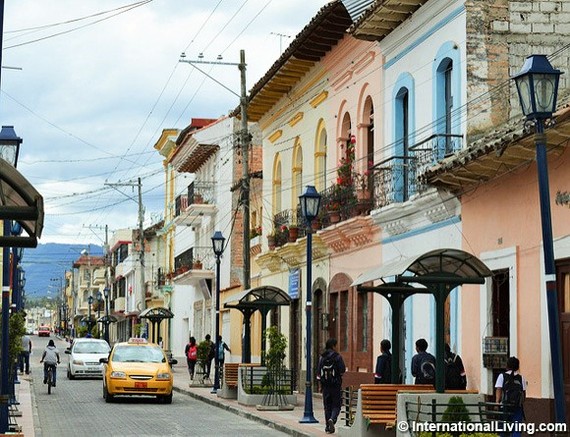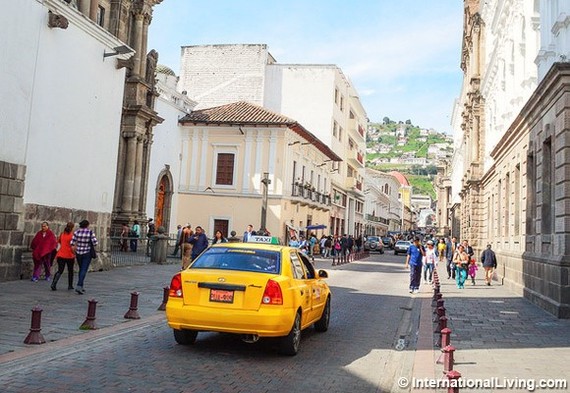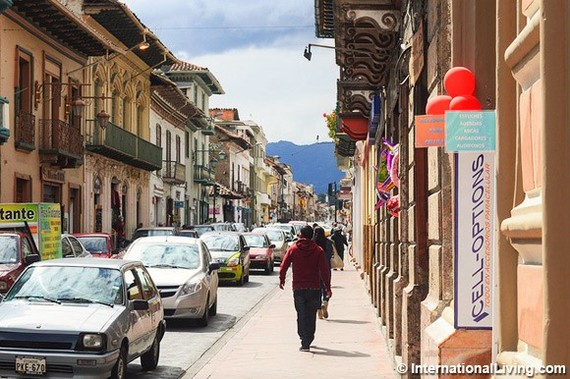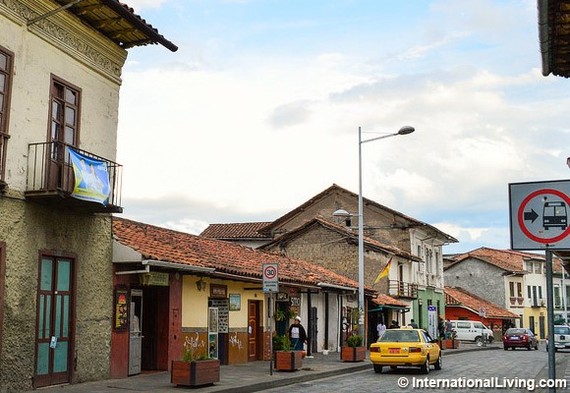When we moved to the little village of Cotacachi, in the northern Andes Mountains of Ecuador, one of the biggest pieces of personal baggage we shed was our car.
Cotacachi, Ecuador
Public transportation is cheap and plentiful in Ecuador, as it is in many of the most popular overseas retirement destinations -- making it possible to take the overhead of owning, maintaining, fueling, and insuring a personal car right off the top of your monthly budget.
Fortunately, we're able to walk about our daily errands ... largely thanks to the perfect day-in day-out climate we enjoy in these equatorial mountains.
Occasionally, though, we take a bus or a taxi. We've found there is a learning curve for using public transportation abroad, especially when it comes to taxis ... and especially if you're a new visitor or an inexperienced expat in unfamiliar surroundings.
Colonial Quarter, Quito, Ecuador
The first and most important piece of advice for travelers abroad goes something like this: "Establish a price before you get in."
While taxis are everywhere, and they're by far the most convenient way of getting around a strange town, as a relative stranger in a strange land, you may have a few challenges:
1.You probably don't speak the same language as the driver.
2.You probably won't know the usual fare for getting from one place to another.
3.You may not see a meter in the taxi ... or, if you do, you discover that the driver does know at least one word of English -- "broken."
4.You assume the driver must be an honest soul and wouldn't possibly charge you more than the standard fare just because of the first three reasons above.
We assure you from personal experience that many taxi drivers are indeed honest souls who won't charge you more than the standard fare just because you're a foreigner who doesn't speak the language or know the customary fares.
Cuenca, Ecuador
We also assure you from personal experience that the percentage of these honest taxi drivers goes down in direct proportion to your proximity to spots where foreigners -- who don't know the language or the customary fares -- are looking for taxis ... such as near bus stations, airports, and hotels.
In these happy hunting grounds, you are more likely to be at least a little overcharged on your first fare or two.
Here's how to deal with these challenges.
1.Learn some of the local language. At least learn how to say, "How much to [destination]?" Even if you don't speak another word of the language, your driver will have to assume that you do, and he will have to come up with a stated fare of some kind. This is the most basic requirement for using foreign taxis. Get the driver to name a fare before you get in, even if you don't immediately understand what he says. You'll eventually figure it out, and even if you discover later that it's incorrect, you will have a baseline to bargain from the next time you take the same trip.
2.The best way to learn the customary fare from one place to another is to ask a local. And the local that most foreigners typically have access to is the concierge, desk attendant, or host at their hotel or hostel or B&B. They will usually know how much it costs to get to your destination, and they will often call the taxi for you, which makes things much easier and, again, gives you a baseline fare to start sussing out the system.
3.Many cities have instituted programs to install meters in sanctioned taxis. This is an attempt not just to reduce the possibility of overcharging, but to let customers know that they're dealing with a licensed taxi operator instead of "independent contractors" who operate without any kind of license or regulation.
When this program was instituted in Quito, Ecuador, it was our experience that only about one in every five or six taxi meters actually worked ... according to the driver. (You can lead a taxi driver to a meter, but you can't make him use it.) When this happens, you have two options. The best, if you have the time, is to explain that you will only ride in a cab with a working meter. And off you go, looking for another driver.
4.Another option is to ... you guessed it ... ask how much the fare is and proceed as though the meter doesn't exist. (Note that both these options require some basic language skills. Also note that meters themselves can be used to inflate prices, so be careful. If you get in a taxi with a working meter, make sure it's zeroed to the base fare. We've gotten in taxis that still had the entire fare from the last ride on the meter ... which would have been our starting fare if we hadn't asked the driver to reset the meter.)
Note: Just because a taxi driver tries to gouge you for a fare doesn't mean he or she is a criminal. In many countries around the world, it is a standard business principle to charge whatever you can get away with. Caveat emptor means the buyer alone is responsible for assessing the quality of a purchase before buying, and this is taken seriously in the taxi business.
If your customer is a foreigner who doesn't know the customary fares, as a taxi driver it can seem almost your duty to charge them as much as you can get away with, and sometimes you can get away with a lot. It's a tough business driving a taxi all day long for a buck or two a ride. A foreigner who doesn't know the customary fares and gets in your car without even asking a price first can make your whole day. So ask a price ... it's your responsibility as a customer.
This being said, it will not take you long, especially outside the big cities, to find taxi drivers who are scrupulously honest and will not overcharge you. All drivers carry personal business cards, and you should get the cards of these drivers as a matter of course so you can call them directly for rides as soon as your language skills are good enough. Such drivers who also speak English are golden, and if you spend any amount of time in a particular place, you will quickly find them and have their numbers on your cell phone speed dial.
So there you have it: Learn some of the language, get input from locals, pay attention to meters if they're in use, and ask a price before you get in.
And once you've arrived at your destination, do you tip a taxi driver?
Colonial Quarter, Cuenca, Ecuador
No. It is not customary to tip taxi drivers in Latin America or most of the rest of the world.
Can you tip a taxi driver? Certainly. Your tip will be gratefully accepted, and it will probably ensure prompt service from that same driver next time, but not because your tip has bought you any respect or good will. You will simply be marked as someone who either doesn't know any better, doesn't mind overspending, or will tip as a matter of course, and any taxi driver worth his or her salt will value a customer like that.
Related Articles
There's No Shame in Becoming an Expatriate
My Love-Hate Relationship with the World of Travel
Five Countries Where $1,500 a Month Is Plenty to Live On
Earlier on Huff/Post50:
















